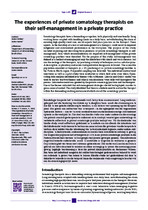The experiences of private somatology therapists on their self-management in a private practice
Abstract
Somatology therapists have a demanding occupation, both physically and emotionally. Long working hours coupled with handling clients on a daily basis, notwithstanding the strain of ensuring high quality client care, are all aspects that place pressure on the therapist. These aspects, in the backdrop of a lack of self-management of a therapist, could result in impaired judgement and substandard performance in the workplace. The purpose of this study included exploring and describing the experiences of private somatology therapists in selfmanagement, from which recommendations for improved self-management within private somatology practices were described. For the purpose of this study, self-management was defined as a method of managing not only the interaction with clients and work stressors, but also the feelings of the therapists, by practising a variety of techniques such as self-discipline. A descriptive, exploratory and contextual qualitative design was followed. The accessible population consisted of therapists (n = 15) practising at six private somatology facilities in the Pretoria North region. Purposeful sampling was followed. Ten individual unstructured interviews as well as a pilot study were conducted in which field notes were taken. Open coding
data analysis identified four themes with subthemes. Lincoln and Guba’s model was
used to ensure trustworthiness and ethical considerations were followed throughout the
process. Informed consent was granted by the private somatology practices and the therapists. One of the themes indicated that self-management strategies should be displayed, in order to gain a sense of control. The study identified that there is a definite need to nurture the therapist within this demanding working environment which we call the somatology practice.

